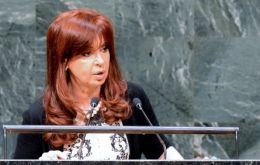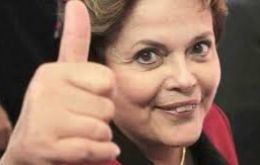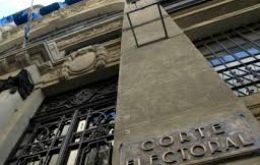MercoPress. South Atlantic News Agency
Stories for September 25th 2014
-
Thursday, September 25th 2014 - 06:44 UTC
Brazil calls for 'true reform' of Security Council and the 're-launching' of global economy

Following the opening remarks by UN Secretary General Ban Ki-moon, Brazil’s president Dilma Rousseff was the first head of state to address the General Assembly on Wednesday. She called for a “re-launching of global economy” and a “true reform” of the UN Security Council.
-
Thursday, September 25th 2014 - 06:34 UTC
Cristina Fernandez claims holdouts are committing “economic and financial terrorism”

Argentine President Cristina Fernández accused holdout investors of committing “economic terrorism” and reiterated her wish for a multi-lateral framework to regulate sovereign debt, during her speech before the United Nations 69th General Assembly on Wednesday.
-
Thursday, September 25th 2014 - 05:17 UTC
Argentina must explain to Judge Griesa why it is not in contempt of court

New York district judge Thomas Griesa has asked Argentina to show cause and explain why the country should not be declared in contempt, following its decision not to pay holdout investors full amount for their defaulted bonds as the judge’s ruling ordered on August 8.
-
Thursday, September 25th 2014 - 05:11 UTC
US dollar brushes 16 Argentine Pesos, settles at 15.95; monthly devaluation 12.4%

The informal rate for the US dollar in Argentina kept climbing on Wednesday and after brushing 16 Pesos, finally closed 53 cents higher at 15.95 Pesos, while the gap with the formal dollar soared to 89%. Distrust with government policy, plain speculation and hikes in the stock exchange rate were blamed for the situation.
-
Thursday, September 25th 2014 - 05:06 UTC
Argentina publicly adds Germany to its list of 'hostile countries'

Argentine Cabinet Chief Jorge Capitanich on Wednesday lashed out at Germany's finance minister, denouncing Berlin's “hostile attitude” toward Argentina's debt restructuring effort. He added that Germany had always had a hostile attitude toward Argentina from an economic and financial point of view.
-
Thursday, September 25th 2014 - 03:17 UTC
Falklands/Malvinas: Cristina Fernandez demands dialogue at UN and blasts Security Council

President Cristina Fernández addressing on Wednesday the United Nations General Assembly said Argentina, in the context of a complex world situation, has become a triple leading case, (vulture funds, terrorism) and one referred to 'the use of force and territorial integrity', more specifically the pending dispute with the United Kingdom over the Falklands/Malvinas.
-
Thursday, September 25th 2014 - 03:14 UTC
Brazil scrambles to support the Real; as Dilma recovers in the polls the currency falls

Brazil’s Real advanced from a seven-month low as the central bank signaled it will maintain support for the currency when it increased the number of foreign-exchange swap contracts offered in a rollover.
-
Thursday, September 25th 2014 - 03:12 UTC
Uruguay presidential campaign: government distributes 10 US dollars for each valid ballot

The Uruguayan government released this week the equivalent of 22.9 million dollars for the financing of political parties campaigning for 26 October when presidential and legislative elections are scheduled. In Uruguay political parties receive government support for electoral activities and private donations are closely scrutinized.
